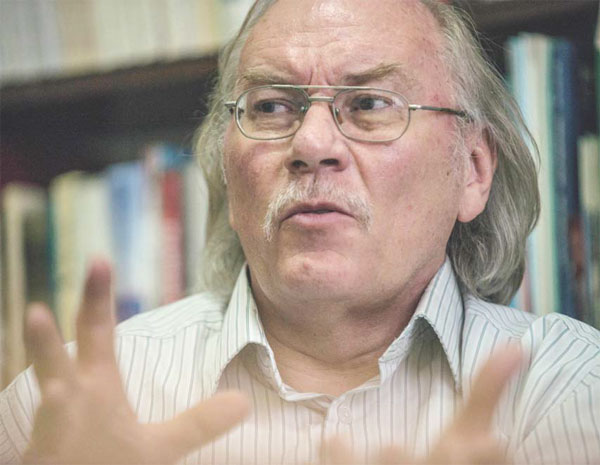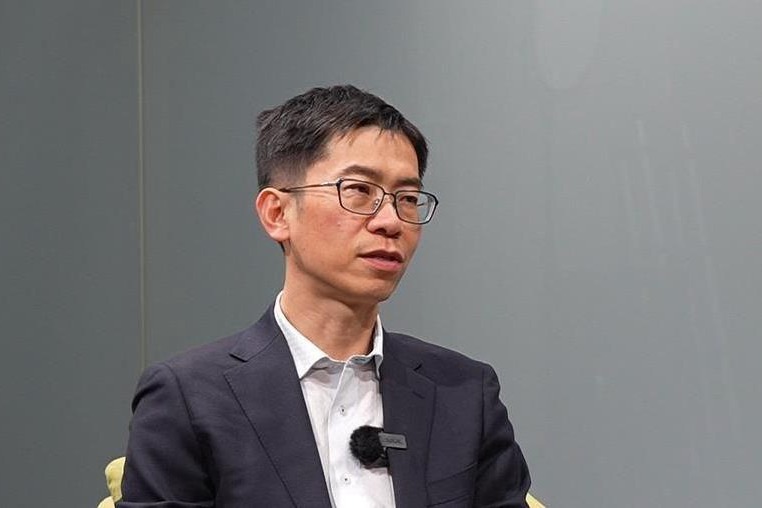Summit 'can take us to the next level'

Professor says China-Africa forum could be the organization's most important meeting in its 15-year history
South African academic Garth Shelton believes the Forum on China Africa Cooperation summit could be the organization's most important meeting in its 15-year history.
The professor of international relations at Witwatersrand University insists it could raise China-Africa relations to a new level.
| Garth Shelton says the FOCAC summit in Johannesburg could for the first time focus on female empowerment. Mujahid Safodien / For China Daily |

"There is no doubt this could be a meeting of real significance. There is a lot of anticipation that President Xi Jinping will announce something new and very exciting," he says.
Shelton released a new book dedicated to the Johannesburg summit, FOCAC 2015: A New Beginning of China-Africa Relations, at the Burgers Park Hotel in Pretoria on Dec 3.
"The aim was to produce a book where Chinese and African scholars could give their viewpoints about the China-Africa relationship. This is important because I think Western academics are often critical of the engagement. We see potential, whereas they want to send out warnings."
Shelton, 58, who was speaking in his book-lined office at Witwatersrand University, where he has been an associate professor since 2002, believes there will be a number of substantive agenda items emerging from the Johannesburg summit.
These will include a stepping up of infrastructure development, investment in high-speed rail, African regional integration, poverty reduction, ecological protection, female empowerment, and a renewed emphasis on security measures.
"I think there will be a genuine attempt to align the FOCAC agenda with that of the African Union's 2063 Agenda, which has a lot of common goals relating to peace and security and also women empowerment," he says.
Shelton, jocular as well as analytical, believes China wants what it has described as "a new epoch" for China-Africa relations, partly built on the continent's key role in China's Belt and Road Initiative.
Kenya's coast is the African stopoff on the 21st Century Maritime Silk Road that then leads to the Middle East and Europe.
Chinese companies are heavily involved in the $24 billion Lamu Port Southern Sudan-Ethiopia Transport corridor, which will link the entire region to the coast.
"I think this would be a new epoch not just for China, but also Africa. The investment in roads, railways and ports would make this part of Africa a key destination on China's Maritime Silk Road and transform the whole region."
Shelton, who co-edited his latest book with Li Anshan, professor of international studies at Peking University, and Funeka Yazini April, a researcher at the Africa Institute of South Africa, says the only concern is that a slowdown in the Chinese economy may affect whether some of the objectives can be met.
"If over the next three to five years the Chinese economy continues to slow, it might have some negative impact on the summit agenda," he says.
Shelton says there will therefore be more interest than usual in the figure for financing projects in Africa that President Xi is likely to reveal in his opening address to the summit.
At the fifth ministerial meeting in Beijing in 2012, then-president Hu Jintao set the figure at $20 billion for loans and funding to the continent.
Premier Li Keqiang on his visit to Africa last year pledged a further $20 billion in assistance, suggesting the new figure that is to be announced in Johannesburg will be around $40 billion.
"This to many is the key indicator. Those attending will be wondering whether this will rise even further to $45 billion, $50 billion or even $60 billion. Many will be disappointed if it was to be below $40 billion. People are wondering whether the slowdown in the economy will have an impact on China's assistance to Africa."
Shelton, who spent a sabbatical year at South Africa's Department of Defence in the late 1990s, believes security issues will be given top priority at this FOCAC summit.
Since the Beijing ministerial conference three years ago, there have been further evacuations of Chinese citizens from Libya, and only last month three Chinese workers were murdered in a hotel siege in the Malian capital, Barnako.
President Xi in his address to the United Nations in New York in September pledged $100 million in military assistance to the African Union.
"What Africa wants is African solutions to African problems, but for us to be empowered we need more peacekeeping training and the proper equipment. This is the sort of help China can provide."
Shelton believes another focus for the first time at a FOCAC meeting will be female empowerment, which is a priority in the AU's Agenda 2063.
"Women empowerment is a big trend in Africa. One of the practical proposals coming out of the summit could be for the Chinese to reserve 50 percent of the places for students going from Africa to study in China for women," he says.
"China is something of a role model in this area. Chairman Mao said women hold up half the sky, and women in China are prominent in all walks of life."
The academic believes the agenda for this FOCAC meeting began to be shaped when President Xi made Africa one of the first overseas destinations when he visited Tanzania, South Africa and the Republic of Congo in 2013.
"He placed quite a lot emphasis on the Chinese dream of national rejuvenation being directly linked to Africa's dream for poverty reduction. This was a very positive message. It was almost as if China could be a role model for Africa," he says.
Shelton, who was born in Johannesburg and has spent most of his career at Witwatersrand as a student and now long-time professor, is a keen student of the FOCAC process.
His previous book, The Forum on China-Africa Co-operation: A Strategic Opportunity, which he wrote with Farana Paruk and was published in 2008, stressed the importance of the China-Africa relationship.
He says one of the most impressive aspects of the forum is China's implementation of the agenda.
There are more than 20 Chinese government departments linked to a FOCAC implementation committee within China's Foreign Ministry.
"If they say they are going to build 20 schools, then 20 schools will be built. We don't have any worry about this happening, and we are very satisfied."
Shelton, who is also a director of the Pretoria-based Institute for Global Dialogue, believes China's building of infrastructure has had a transformative effect on the continent.
He is dismissive of those who argue that setting up factories and driving the industralization of the continent would have been effective.
"I have visitors from China who say they would love to invest in manufacturing but are concerned about how they would get their goods from the manufacturing plant to the harbor and then export it. I think the manufacturing investment will flow not just from China but elsewhere, but you have to have the infrastructure first."
Shelton, who has visited more than 30 cities in China since he first went there in 1994, is someone who believes concepts of "win-win" and "mutual benefit", which have been themes at previous FOCAC summits, are genuine and not just empty rhetoric.
"I think people fundamentally misunderstand 'win-win', in particular. It does not mean that on every project each side gets 50 percent of the benefit.
"Sometimes, it might be 60-40 or 70-30 and it is certainly not China that always does most of the winning. The important point is that it is still a positive outcome for both sides."
andrewmoody@chinadaily.com.cn
(China Daily European Weekly 12/04/2015 page10)
Today's Top News
- Japan tempting fate if it interferes in the situation of Taiwan Strait
- Stable trade ties benefit China, US
- Experts advocate increasing scope of BRI to include soft power sectors
- New engine powers cargo drone expansion
- China to boost green industry cooperation
- Manufacturing PMI rises in November































